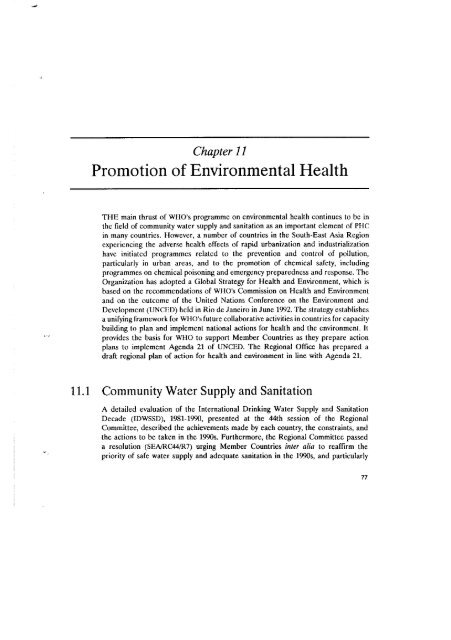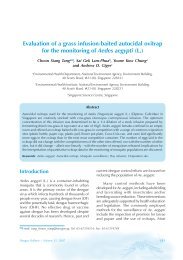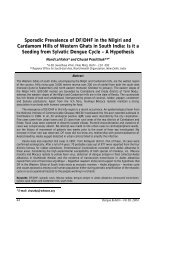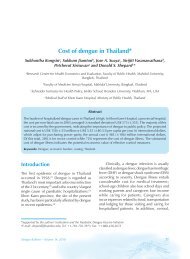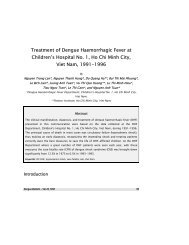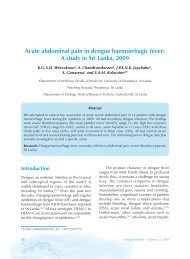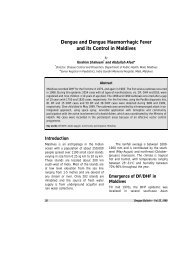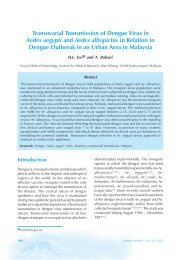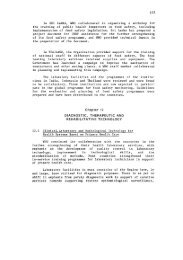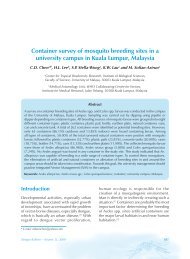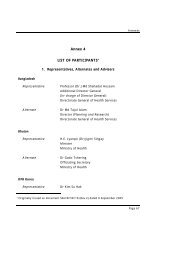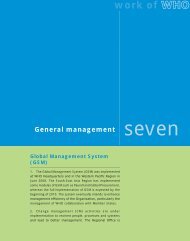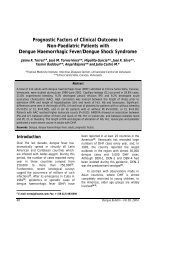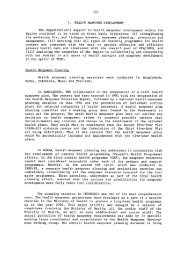Promotion of Environmental Health - WHO SEAR Digital Repository
Promotion of Environmental Health - WHO SEAR Digital Repository
Promotion of Environmental Health - WHO SEAR Digital Repository
You also want an ePaper? Increase the reach of your titles
YUMPU automatically turns print PDFs into web optimized ePapers that Google loves.
Chapter 11<br />
<strong>Promotion</strong> <strong>of</strong> <strong>Environmental</strong> <strong>Health</strong><br />
THE main thrust <strong>of</strong> <strong>WHO</strong>'s programme on environmental health continues to be in<br />
the field <strong>of</strong> community water supply and sanitation as an important element <strong>of</strong> PHC<br />
in many countries. However, a number <strong>of</strong> countries in the South-East Asia Region<br />
experiencing the adverse health effects <strong>of</strong> rapid urbanization and industrialization<br />
have initiatcd programmes relatcd to the prevention and control <strong>of</strong> pollution,<br />
particularly in urban areas, and to the promotion <strong>of</strong> chemical safety, including<br />
programmes on chemical poisoning and emergency preparedness and response. The<br />
Organization has adopted a Global Strategy for <strong>Health</strong> and Environment, which is<br />
based on the recommendations <strong>of</strong> <strong>WHO</strong>'s Commission on <strong>Health</strong> and Environment<br />
and on the outcome <strong>of</strong> the United Nations Conference on the Environment and<br />
Development (IJNCIil)) hcld in Rio de Janeiro in June 1B2. The strategy establishes<br />
a unifying framework for <strong>WHO</strong>'s future collaborative activities in countries for capacity<br />
buildingto plan and implement national actions for health and the environment. It<br />
provides the basis for <strong>WHO</strong> to support Member Countries as they prepare action<br />
plans to implement Agenda 21 <strong>of</strong> UNCED. The Regional Office has prepared a<br />
draft regional plan <strong>of</strong> action for health and environment in line with Agenda 21.<br />
11.1 Community Water Supply and Sanitation<br />
A detailed evaluation <strong>of</strong> the International Drinking Water Supply and Sanitation<br />
Decade (IDWSSD), 1981-1990, presented at the 44th session <strong>of</strong> the Regional<br />
Committee, described the achievements made by each country, the constraints, and<br />
the actions to be taken in the 1990s. Furthermore, the Regional Committee passed<br />
a resolution (SEAiRC44iR7) urging Member Countries inter alia to reaffirm the<br />
priority <strong>of</strong> safe water supply and adequate sanitation in the 1990s, and particularly
to meet the needs <strong>of</strong> the poor while monitoring progress continually. Subsequently,<br />
a document, "Decade Assessment and Perspective for the 1990sV, was prepared<br />
i.<br />
highlighting the water supply and sanitation coverage targets by the year 2000<br />
(Table 6).<br />
Tabk 6. Percentage <strong>of</strong> urban and rural population coverage<br />
Saclor<br />
Coveraga mind<br />
1 OM) loo0<br />
Targel tor<br />
2000<br />
Water Supply<br />
Urban<br />
Rural<br />
Sanitation I I 1<br />
Urban<br />
Rural<br />
64<br />
31<br />
76<br />
66<br />
a3<br />
95<br />
The above table shows that more intensive efforts have to be made in the coming<br />
years to realize the targets set for the end <strong>of</strong> this decade, particularly for sanitation.<br />
1. institutional Development<br />
During the period under review, support was provided for strengthening the<br />
institutional development <strong>of</strong> sector agencies through consnltancies, special studies,<br />
and the development <strong>of</strong> management information systems. An assessment <strong>of</strong> water<br />
quality surveillance was undertaken in Bangladesh when a programme was developed<br />
for implementation. A review and assessment <strong>of</strong> the operation and maintenance <strong>of</strong><br />
water supply and wastewater systems in India was undertaken with <strong>WHO</strong> assistance.<br />
A consultant was assigned to Maldives to assist in the improvement <strong>of</strong> water supply<br />
and wastewater systems. In Myanmar, a review <strong>of</strong> the sanitation programme for *<br />
schools, health posts and communities was completed. In Nepal, a study on sanitation<br />
was supported in order to develop the national sanitation strategy for the 1990s. A<br />
consultant reviewed the sanitation programmes in the countries <strong>of</strong> the Region, and<br />
studies were carried out in Bangladesh, Indonesia, Nepal and Sri Lanka on the<br />
promotion <strong>of</strong> hygiene and sanitation for review at a regional consultation in May<br />
1993.<br />
2. Human Resources Development<br />
<strong>WHO</strong> continued to support the strengthening and development <strong>of</strong> human resources<br />
through fellowships, special training courses/obse~ation tours and other group<br />
educational activities for engineers from Bangladesh, India, Maldives, Myanmar,<br />
I
<strong>Promotion</strong> oi Envlronmont.l <strong>Health</strong><br />
Nepal and Sri Lanka. In-country training for para-pr<strong>of</strong>essional engineers and health<br />
<strong>of</strong>ficials was organized in Bangladesh and Nepal. National workshops on<br />
computer-based project management using <strong>WHO</strong>RlQ's <strong>Environmental</strong> <strong>Health</strong><br />
Information for Management <strong>of</strong> Development Activities (EIIMDAC) s<strong>of</strong>tware were<br />
conducted in Bangladesh. As part <strong>of</strong> the UNIIP-funded sector training project,<br />
pr<strong>of</strong>essional and sub-pr<strong>of</strong>essional staff received training in the implementation <strong>of</strong><br />
water supply and sanitation projects in Nepal. Support was provided for setting up<br />
national training institutions in water supply and sanitation in Bangladesh and Nepal.<br />
3. Monitoring <strong>of</strong> Water Supply and Sanitation Programmes<br />
Emphasis continued to be focused on further development and strengthening <strong>of</strong> MIS<br />
(management information system) capabilities in national water supply and sanitation<br />
agencies in Bangladesh, Nepal and Sri Lanka. In Bangladesh, sector monitoring is<br />
also being expanded through a grant from the Swiss Development Corporation.<br />
4. Project Support<br />
Many countries received support through the provision <strong>of</strong> laboratory equipment and<br />
chemicals and supplies, computcr hardware and s<strong>of</strong>tware, and <strong>of</strong>fice and other<br />
equipment for their CWS projects.<br />
<strong>Environmental</strong> <strong>Health</strong> in Rural and Urban<br />
Development and Housing<br />
Most countries increasingly face problems <strong>of</strong> uncontrolled population growth and<br />
rapid unplanned urbanization, which jeopardize the health <strong>of</strong> people, particularly<br />
those living in slums and squatter settlements.<br />
A Regional Consultation on Municipal Solid Waste Management held in October<br />
1091 rcsulted in the publication <strong>of</strong> a report entitled "National Institutional<br />
Development for Solid Waste Management - Goals and Action". As a follow-up <strong>of</strong><br />
this consultation, a document to serve as a guide in the selection <strong>of</strong> storage, collection<br />
and transportation equipment for solid waste management is being prepared.<br />
In an effort to increase the cross-sectoral issue <strong>of</strong> drainage, a joint<br />
wHO/UNDPporld Bank regional workshop was held in October 1991 and a document<br />
on "Direction in drainage for the 1990s" was published outlining the various strategies<br />
and actions at national, community and donor levels.
-<br />
Many countries <strong>of</strong> the Region are experiencing environmental health problems<br />
related to rapid urbanization. A '<strong>Health</strong>y City' project for six major cities <strong>of</strong> the<br />
Region was prepared jointly with ESCAP. In Bangladesh, a healthy city workshop<br />
to address problems <strong>of</strong> urbanization was supported. Assistance was provided to Sri<br />
Lanka for undertaking community environmental health assessments. Case studies<br />
on intersectoral approaches to community management <strong>of</strong> environmental problems<br />
were initiated in Bangladesh and Sri Lanka. A consultant assisted Myanmar in<br />
reviewing latrine construction in urban areas.<br />
11.3 <strong>Health</strong> Risk Assessment <strong>of</strong> Potentially<br />
Toxic Chemicals<br />
<strong>WHO</strong> collaboration in this area focused mainly on human resource development<br />
through national workshops, study tours and participation in international conferences<br />
as well as dissemination <strong>of</strong> technical information.<br />
Courses for trainers on early diagnosis, treatment and control <strong>of</strong> pesticide poisoning<br />
were held in India, Indonesia and Thailand involving the health, agriculture and<br />
industry departments. An intersectoral workshop was also organized in Myanmar<br />
to develop a training manual on managing pesticide poisoning. Development <strong>of</strong><br />
national poison centres was supported in India, Indonesia and Thailand through the<br />
organization <strong>of</strong> workshops and the supply <strong>of</strong> computer equipment. Workshops on<br />
technological and chemical disaster management were organized in India and<br />
Indonesia. Work on legislation and regulations on the use <strong>of</strong> hazardous and toxic<br />
substances was completed in Indonesia. Legislation on hazardous chemicals was<br />
reviewed in Thailand, where chemical safety management was also assessed in order<br />
to develop a comprehensive chemical safety monitoring system. <strong>Environmental</strong><br />
epidemiology courses under the International Programme <strong>of</strong> Chemical Safety (IPCS)<br />
were held in Indonesia and Thailand. A comprehensive environmental epidemiology<br />
programme was drafted in India.<br />
*'<br />
11.4 Control <strong>of</strong> <strong>Environmental</strong> <strong>Health</strong> Hazards<br />
Collaboration with the countries was focused on activities related to the management<br />
<strong>of</strong> environmental health hazards. As stated earlier, an approach paper was prepared<br />
for the development <strong>of</strong> action plans for health and environment under Agenda 21<br />
<strong>of</strong> UNCED, and a regional action plan for developing environmental health plans in<br />
the countries was drafted.<br />
4
The Organization supported studies in India on groundwater pollution, industrial<br />
water consumption, the pollution monitoring system, financial aspects <strong>of</strong> pollution<br />
control, and environmental epidemiological studies in certain critically polluted areas.<br />
Training courses on control <strong>of</strong> noise pollution were organized in lndia and Indonesia.<br />
WIIO arranged the participation <strong>of</strong> Indian <strong>of</strong>ficials in the International Conference<br />
on Water and Environment in Ireland and in a seminar on environmental policy<br />
and regulations in the United States. Fellowships in the United Kingdom and the<br />
United States were provided for the training <strong>of</strong> pollution control staff from India<br />
in hazardous waste management and control <strong>of</strong> toxic chemicals and pollutants.<br />
Technical staff from Myanmar and Thailand were trained abroad in the disposal <strong>of</strong><br />
toxic wastes. Study tours were organized for <strong>of</strong>ficials from DPR Korea, lndia and<br />
Thailand. Assistance was extended to Thailand for undertaking air pollution<br />
monitoring and control in two districts in Lampang Province. A consultant assisted<br />
Bangladesh in preparing a programme on the control <strong>of</strong> toxic chemicals and hazardous<br />
waste management.<br />
Under the Global <strong>Environmental</strong> Monitoring System (GEMS), water quality<br />
monitoring was continued in India, Indonesia and Thailand. As part <strong>of</strong> GEMSIAir<br />
quality monitoring, special reports on the quality <strong>of</strong> air in Bangkok, Bombay, Calcutta,<br />
Jakarta and New Delhi were prepared and wlro support was provided for data<br />
collection and analysis at monitoring stations in India, Indonesia and Thailand. In<br />
Bombay, the Human Exposure Assessment Location (HEAL) project continued to<br />
be implemented, while a new HEAL study on lead exposure was initiated in Bangkok.<br />
11.5 Food Safety<br />
WIIO's efforts in this area were directed towards technical cooperation with Mcmbcr<br />
Countries in developing their food safety programmes through institutional<br />
strengthening and human resource development. The Regional Office prepared a<br />
regional food safety document giving an overview <strong>of</strong> current country situations and<br />
future perspectives for strengthening national programmes.<br />
<strong>WHO</strong> supported the organization <strong>of</strong> a workshop on surveillance, prevcnlion and<br />
control <strong>of</strong> food adulteration in India as well as the preparation <strong>of</strong> manuals on good<br />
manufacturing practices and laboratory procedures. Studies were also initiated on<br />
pesticide residues in food staples, on plastic food containers and on mutagenic<br />
studies <strong>of</strong> certain foods. Assistance was provided to Indonesia for reviewing its<br />
national food safety activities and identifying areas in need <strong>of</strong> support, and a draft<br />
nalional food sanitation programme was prepared. A research study on street-vended<br />
foods in Bali and draft guidelines for street food safely were also completed, and<br />
training courscs on food technology and food sanitation inspection for provincial<br />
and district-level staff were held. Study tours to observe food safety programmes
me Work <strong>of</strong> <strong>WHO</strong> In Sov(h-Ea.1 Aala<br />
were organized for <strong>of</strong>ficials from Indonesia and Sri Lanka. In Sri Lanka, an evaluation<br />
<strong>of</strong> the national food safety programme was carried out and a UNDP-assisted food<br />
safety development project document was prepared. Support was given to the training<br />
<strong>of</strong> public health inspectors and medical <strong>of</strong>ficers in food safety. Thailand received<br />
support for a national computerized information network on food safety analysis<br />
and quality control and for studies on the dietary intake <strong>of</strong> arsenic and tin and on<br />
lead contamination levels in street foods in Bangkok. Technical assistance on the<br />
analytical aspects <strong>of</strong> food quality was provided to DPR Korea.<br />
Selected Codex Alimentarius texts and guidelines were translated and published<br />
in Indonesia, while in India the national food standards were reviewed so as to<br />
harmonize them with the Codex standards.<br />
Y


